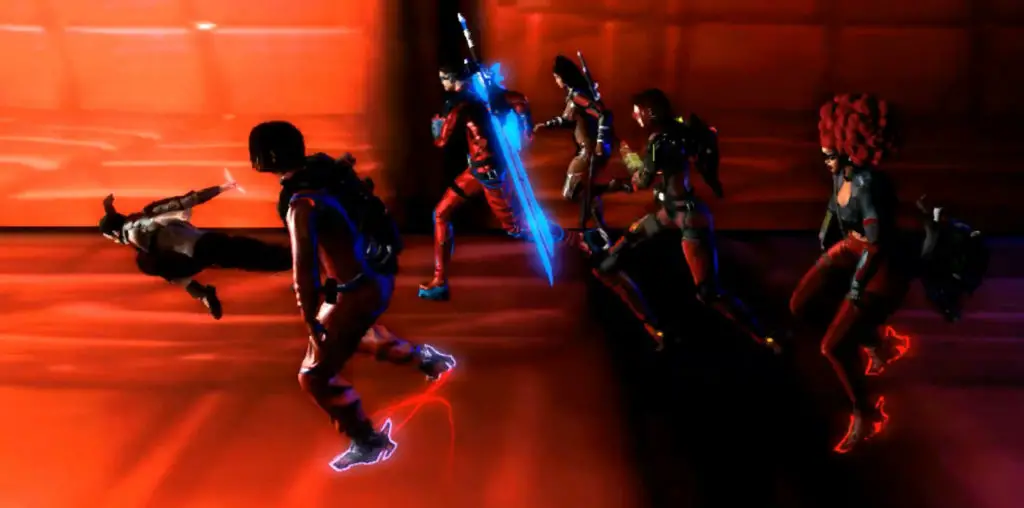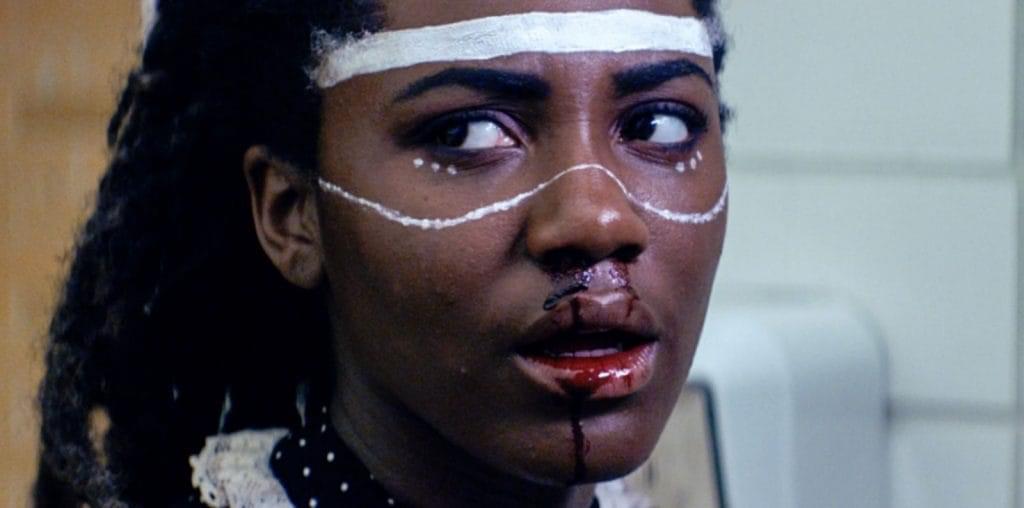
REVIEWS INCLUDE:
BEAVER TRILOGY PART IV
BLACK PANTHERS: VANGUARD OF THE REVOLUTION
CHORUS
JAMES WHITE
THE MASK YOU LIVE IN
Anticipating that I would be going non-stop and might not be able to keep on schedule actually writing about what was happening that very day and meet a daily deadline, I watched as many films as I could before getting to Park City. Here are my reviews from five of those films:
BEAVER TRILOGY PART IV
Brad Besser’s BEAVER TRILOGY PART IV introduces us to filmmaker Trent Harris, and the making of his low-grade cult Beaver films. Besser has an embarrassment of riches at his fingertips or more correctly stated – in front of his camera lens, for us to enjoy. Harris himself is an entertaining and somewhat eccentric subject, but the films themselves are even more so ripe for exploring or exploiting – depending on your viewpoint or mood. The original film was a mini-documentary on a young man known from Beaver, Utah known as “Groovin’ Gary” that Harris happened upon in the parking lot of the local TV station he worked for as he was testing a new video camera. Subsequently, Harris sought to recreate the initial “magic” he felt as he caught him on camera for that initial interview and then later at a talent show in a drag performance as Olivia Newton John, with short films starring unknown actors Sean Penn and Crispin Glover in the title roles. Fortified by clips from each of the films, the identity and background of the enigmatic young man who inspired the Beaver Trilogy is humorously traced in pursuit of making this, the fourth Beaver film.
BEAVER TRILOGY PART IV is a documentary film as curiosity. With shades of BEST WORST MOVIE, the film takes a tongue securely lodged in cheek approach as the true identity of “Groovin’ Gary” is researched, family members are interviewed and Harris recounts the winding road that led to the making of all three films, as well as their checkered results of those efforts. It is light, and amusing, with little ambition to be anything else. While not for the filmgoer looking for any kind of depth in their documentary viewing experience, the film will certainly entertain those that do.
Expected Sundance Reaction: An interesting case, in that the film will play extremely well to the home town fans (for obvious reasons), it should also be a talking point movie due to the extreme curiosity factor.
Expected Real World Reaction: This one has prime VOD spot written all over it.
BLACK PANTHERS: VANGUARD OF THE REVOLUTION
Stanley Nelson’s BLACK PANTHERS: VANGUARD OF THE REVOLUTION is a thorough examination of the rise and fall of the Black Panthers. Tracing the party’s development from its inception as the Black Panther Party for Self-Defense to protect African Americans from physical abuse by the police, the rise and influence of Black Panther leaders and firebrands like Huey Newton, Eldridge Cleaver and Bobby Seale, the protest at the California State House over the “Mulford Act”, the Free Huey campaigns, the success of the Free Breakfast for Children program, the J. Edgar Hoover led FBI COINTELPRO secret and illegal actions to dismantle the group, and the destructive rift between Newton and Cleaver, and much more, the film misses very little as it shines a light on a major point and influence in our country’s history. Utilizing archive footage and an impressive host of interviews with former Black Panther members as well as white supporters and detractors, the film attempts to offer unprecedented insight into the inner workings of the Black Panthers and get a handle on many different facts of a complex political movement within our country’s history.
BLACK PANTHERS: VANGUARD OF THE REVOLUTION is a documentary that works hard to encompass both a description of the major historical points on a subject’s timeline through “you are there” footage and photographs as well as provide personal accounts from the players and spectators who saw and experienced that history. The question is always how rich or vibrant that re-telling will be – school lesson plan laboriousness or “history comes alive” excitement? And for the most part, Nelson succeeds in not squelching the energy of the Black Panther story by placing us alongside the people that lived, fought, and sometime died to achieve what the Black Panthers managed to accomplish on behalf of African Americans in spite of tremendous odds. With current events as they are following the events in Ferguson and elsewhere around the country, the film could not be more timely as we see history repeating itself with the unchecked abuses of police toward African Americans. Watching the film, you can’t help but hope that we can take some key lessons from how this problem was dealt with both wisely and un-wisely 50 years ago.
Expected Sundance Reaction: I can see this film being one of the “required viewing” docs during the fest.
Expected Real World Reaction: If marketed properly, the film could make a very strong run and even do the multi-plex business.
CHORUS
François Delisle’s CHORUS opens with a prisoner’s confession of a heinous crime: the abduction and murder of a little boy. Now, ten years after their son’s disappearance, the parents are brought back together after having separated by geography – he to Mexico, and her back in Montreal – and by their emotional isolation, having mutually walled off the world and each other in an effort to keep their grief over the loss of their son at an arm’s distance. Forced by the duty to identify the remains, and deal with the business of wrapping up the case and officially closing the book on the life of their son, they are also forced to face their unresolved hurt and guilt together.
Presented in crisply stark black and white photography, CHORUS strips away all that it can in an effort to focus uncompromisingly on the emotional journey of two people that have internalized a great loss – that of their child. Devoid of histrionics, and with a paucity of dialogue, it draws us in deeper to the suffering of the man and woman, and makes each moment they reach out to one another in tern more desperate, and potentially more rewarding. This is not a film that means to reveal a secret – the ghost is literally given away at the beginning of the film. No, this is an essay on loss, and grief, an exploration of how the heart deals with that and the different way in which two people attempt to heal from that emotional damage and still remember the love that once held them together. It is finely wrought and deeply felt, and a rewarding journey for the viewer.
Expected Sundance Reaction: There are no stars, just a beautifully realized film. But the simplicity of the presentation may work against it.
Expected Real World Reaction: This one should do well on the art house circuit.
JAMES WHITE
Josh Mond’s JAMES WHITE stars Christopher Abbott in the title role as an alcoholic charmer in his twenties keeping some potent demons at bay as he cares for his seriously ill mother (Cynthia Nixon) and fends off a future that is knocking at his door. The story opens with the wake for White’s father, and takes him through a “break” in Mexico and back to his mother’s side after she suffers a dire relapse. Throughout, the young man instigates fights, romances women, toys with opportunities and drinks non-stop to put off the inevitability that his lifeline keeping him tethered to the world as well as his excuse to stay comfortably put is dying – despite anything he can do to keep her alive and his status quo at quo.
Oftentimes harrowing, and always balanced on an emotional tightrope, JAMES WHITE is as intense a character study as you can hope to find, Mond keeps his camera so tightly on Abbott’s face throughout the film that the intimacy with his boyish features makes you the character’s ally whether you want to be or not. That is effective and appropriate as a character like White also doesn’t give you the choice – or at least that would be his perception, his assessment of “the room.” And while we’ve seen characters drawn like this before, what makes this one (and this film) absolutely compelling is the raw, naked display of the gears turning moment-to-moment in someone’s life before us. His mother repeats to him, “You need to be here when you say you’ll be here.” And while he does everything he can to not be there, there is the promise of redemption in just how much he is once he is present with her. He’s worth our time, the question is will he come to that understanding – and the film explores that dilemma wonderfully.
Expected Sundance Reaction: Something tells me that this one connects with the Sundancers.
Expected Real World Reaction: Depending on what kind of boost it comes out of Park City with, I could see some multiplex potential. If not, then solid art house.
THE MASK YOU LIVE IN
Jennifer Siebel Newsom’s documentary THE MASK YOU LIVE IN uses the seemingly innocuous term to “man up” as a leaping off point to explore and examine the concept of masculinity in our culture. What follows is an avalanche of first-hand accounts and experiences from men (and boys) of all ages, experts, doctors, educators, and a deluge of facts and figures like; 1 in 4 boys are bullied, 1/3rd report it, every day 3 or more boys commit suicide (six times the rate of girls), etc. Theories that “the mask of masculinity prevents boys from reaching out for help” and “domination and aggression are what male figures we look up to are teaching us” and “while good men don’t perpetrate violence, they are part of the fertile ground that allows it to happen” are broken down, analyzed and discussed in a film that aspires to not leave a single stone unturned when it comes to the influence of modern masculinity, repressed emotion and gender stereotypes on the health of today’s males.
THE MASK YOU LIVE IN is both a documentary of our time and yet, somewhat evergreen, as the issues of how boys are raised to adhere to rigid gender roles and the pressure put upon them to do so has, of course, always been here. However, the film offers all of the most recent facts and figures to support the contention of its various talking heads as to why that is destructive. Unfortunately, while the point(s) being made is confirmed and re-confirmed on screen for us, it leaves little time to give us the human element to marry those facts and figures to. Yes, there are a number of first hand accounts of the boys and men affected, but there are honestly too many to truly connect with – undercutting the emotional connection to help make the message stick. Ultimately, the film is like a really good book report that undercuts itself by including way too many footnotes.
Expected Sundance Reaction: I see a lot of appreciation for the message but the passion not quite being there when it comes to the buzz for the film.
Expected Real World Reaction: Similar to last year’s FED UP in the kind of film-going traction it would look to achieve.

